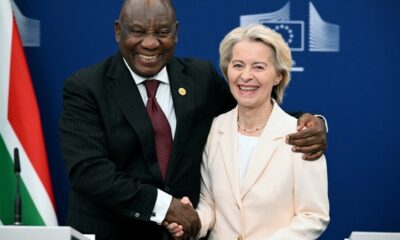Business
Another Global Giant Quits South Africa: Nielsen to Exit After 100 Years of Market Research Legacy

A shock exit from Rosebank
South Africa is bracing for another corporate exit as Nielsen, the global leader in audience measurement and media analytics, confirmed it will shut down its local operations within the next 12 months. The company, which has been part of the country’s advertising, television, and radio industries for decades, currently operates out of Rosebank, Johannesburg.
The announcement follows an internal business review, with Nielsen saying the decision was “difficult” but necessary. “We will continue to fulfil our contractual commitments through a lengthy transition period,” the company assured, adding that it would work with South Africa’s Broadcast Research Council (BRC) to ensure continuity.
Why Nielsen matters in South Africa
For the average South African viewer, Nielsen might not be a household name, but its fingerprints are everywhere. From deciding which soapies get prime-time slots to helping marketers understand who listens to breakfast radio, Nielsen’s Television Audience Measurement Survey (TAMS) and Radio Audience Measurement Survey (RAMS) have been central to how media is bought, sold, and consumed in South Africa.
Losing Nielsen raises a critical question: Who will South Africa now rely on to measure who’s watching what?
The BRC says it has already identified a new provider to take over, with interim measures to avoid a blackout of audience data. However, the transition will take 15 to 18 months, during which advertisers, broadcasters, and marketers will be watching nervously.
A pattern of international withdrawals
Nielsen’s exit adds to a growing list of global companies retreating from South Africa. In just the past year:
-
Bain & Company, the global consultancy, wound down local operations.
-
Anglo American scaled back significant mining assets, including platinum.
-
Shell offloaded its forecourt and downstream fuel operations.
-
International banks like HSBC, Barclays, and BNP Paribas closed their relatively small local offices.
Each of these departures sends ripples through South Africa’s already fragile economy. Together, they paint a picture of a business environment that global corporates increasingly see as high-risk or less profitable.
But it’s not all doom and gloom
Interestingly, even as international players exit, new ones are moving in. French resort giant Club Med is opening its first South African resort, OKU Hotels is reviving Cape Town’s Ritz Hotel, and Tata Motors is returning with new passenger vehicles. Mining firm West Wits Mining is even launching South Africa’s first underground gold mine in 15 years.
This split reality highlights the contradictions of South Africa’s investment landscape: while some industries see retreat, others spot opportunity.
Public reaction: frustration, but not surprise
On social media, Nielsen’s announcement drew weary responses. “Another one leaving? Not surprised,” wrote one Johannesburg advertising executive on LinkedIn. Others in the marketing community expressed concern over the reliability of audience measurement during the handover period, warning that the uncertainty could hurt advertisers and broadcasters already struggling with squeezed budgets.
There’s also frustration that yet another major multinational is bowing out, reinforcing a narrative that South Africa is losing its edge as a global business destination.
Nielsen’s withdrawal is about more than just datait’s about credibility. In a world where audience measurement drives billions of rands in advertising, the exit of the world’s most trusted brand in the space leaves a vacuum.
South Africa must now prove that its local systems can deliver reliable, independent, and internationally comparable data. If not, advertisers may hesitate, broadcasters may struggle to sell airtime, and audiences may unknowingly be caught in the middle of a data gap.
For now, all eyes will be on the BRC’s transition plan and the as-yet-unnamed company that will replace Nielsen. The handover may determine whether this exit becomes just another blip in South Africa’s corporate history or a turning point in how the country measures and values its media.
{Source: BusinessTech}
Follow Joburg ETC on Facebook, Twitter , TikTok and Instagram
For more News in Johannesburg, visit joburgetc.com



























